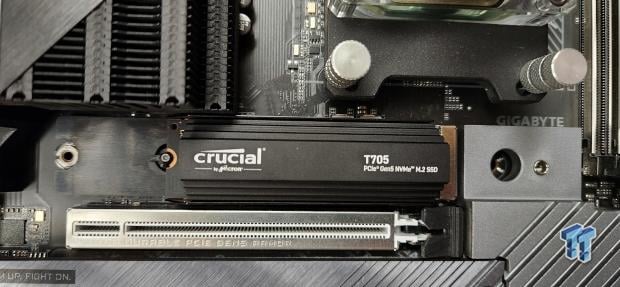
The Bottom Line
Pros
- + Best gaming SSD
- + User experience
- + PS5 compatible
Cons
- - None
Should you buy it?
AvoidConsiderShortlistBuyIntroduction & Drive Details
Phison E26-controlled retail SSDs appeared on the scene about a year ago and have been building toward a performance crescendo that has now peaked in the retail space at over 14,600 MB/s throughput with the official launch of today's test subject, the Crucial T705 2TB. Crucial's 2TB T705 snatches the TweakTown flash-based retail performance crown from the 14,100 MB/s-capable 4TB Rocket 5 we reviewed four weeks ago. This is not unexpected because we know from previous hands-on experience that the 2TB capacity point is where Phison's E26 controller delivers the most performance.
Of all the Phison partners out there, Crucial is by far the biggest and most capable due to its fab-level NAND access and teams of firmware engineers. So, while for most other partners, the difference between E26 offerings is mostly cosmetic in nature, Phison-powered Crucial SSDs can have differences that are more than just skin deep. For the 2TB T705 this could potentially be the case, as we are getting a bit more real-world performance than we've ever gotten before from a retail ready 2TB E26 final form SSD.
Phison's E26 controller has proven to be a game changer on the performance front - in fact, it is currently the world's most powerful consumer controller in retail circulation. But that's only part of what makes an E26-controlled SSD tick. Just as important is the flash found behind said E26 controller. Do you want the world's best-performing SSD? Then you will need the world's best-performing flash, which just so happens to currently be made by Crucial's parent company, Micron.
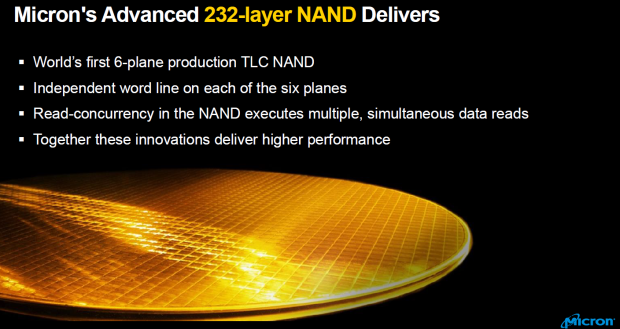
Code named B58R, Micron 232-Layer flash has proven to be the best-performing TLC flash in the world. Fastest flash + fastest controller = fastest SSD. You can't have one without the other. In fact, every E26 controlled SSD in existence is arrayed with Micron B58R flash of varying bins/speeds.
Crucial's T705 Gen5 SSD is fully optimized for performance. It takes full advantage of Microsoft DirectStorage technology, loads high-resolution, detailed game textures and assets faster, and maximizes I/O performance. With it, a properly equipped PC can load up to 60% more gaming data with 99% less CPU utilization. It is currently the world's best gaming SSD, and by a significant margin.
Furthermore, Content creators and professionals can get up to 40% faster performance in real-world tasks than Gen4 SSDs when booting Windows, starting applications like Adobe Photoshop and Illustrator, working with popular applications like Microsoft Excel and PowerPoint, and copying large or multiple files. Additionally, the T705 is designed to manage the demands of data-heavy AI applications, delivering performance up to 55% faster than Gen4 SSDs.
Crucial's 2TB T705 simply delivers more of what we want from an enthusiast perspective than anything flash-based that's come before it. Now, let's check this thing out!
Drive Details
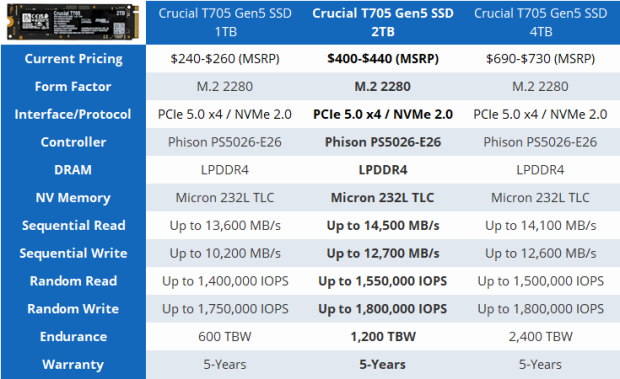
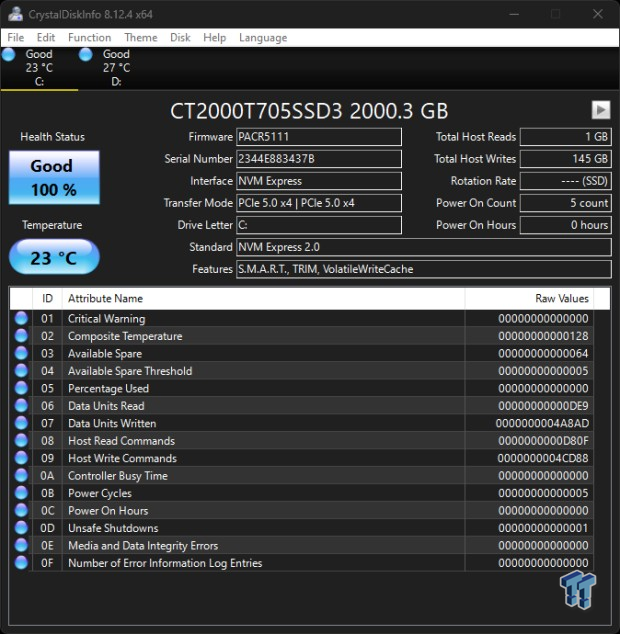
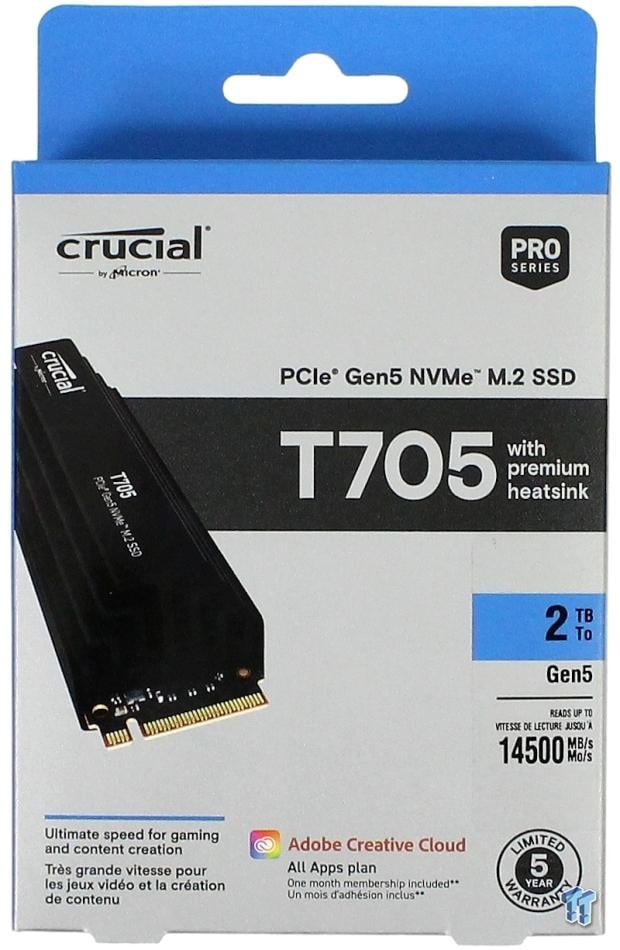
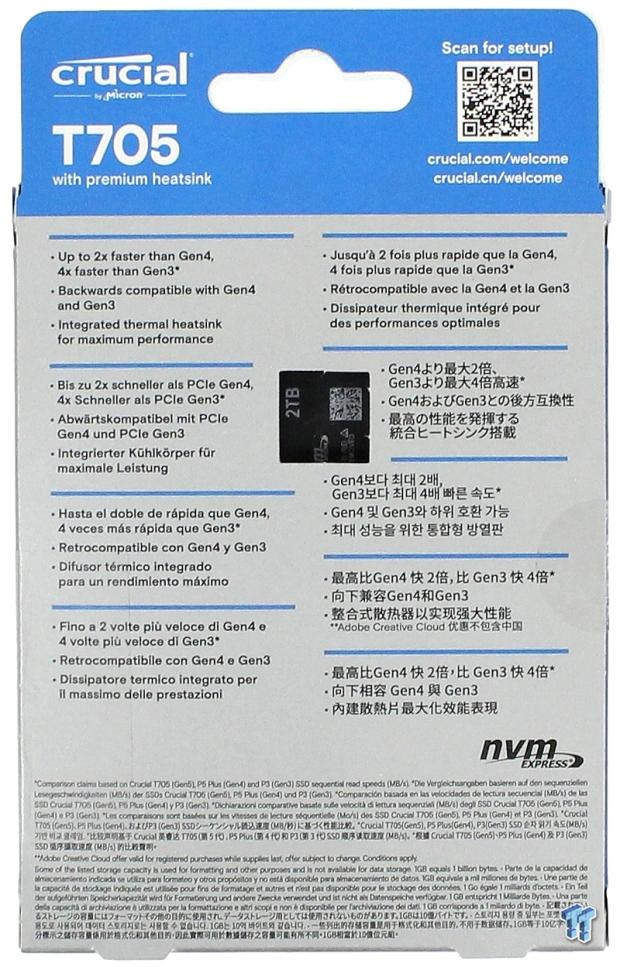


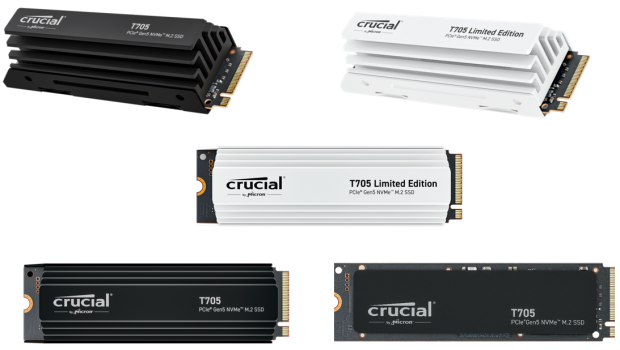
Crucial's T705 looks pretty much identical to the T700 that came before it. The same passively cooled heatsink as before is also available as a bare drive, same as before, but it differs from the T700 in that it is available in a stunning white limited edition 2TB model. The bare drive is ideal for those with capable motherboard heatsinks or for PlayStation 5 storage expansion when used in conjunction with an aftermarket heatsink designed specifically for PS5. So, how effective at taming thermals is Crucial's specially designed passive heatsink?
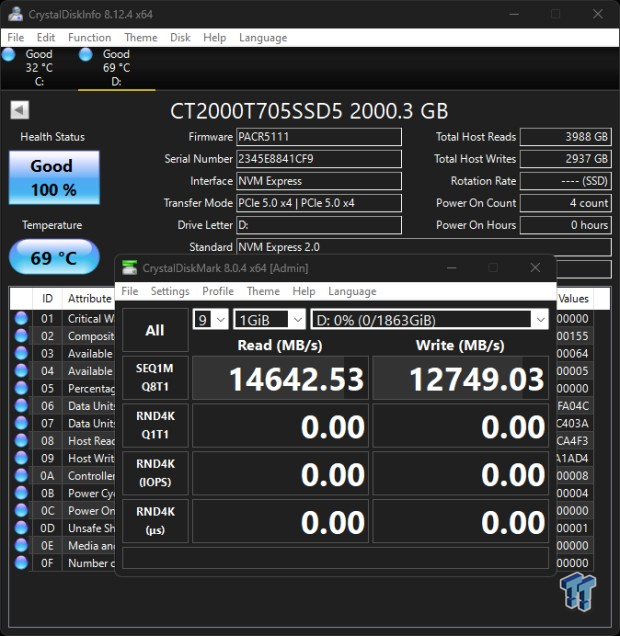
With some minimal case airflow, we put the heat to ours, and the drive stayed comfortably below its 81c thermal throttling threshold. 69c after 9 iterations of CDM sequentials exceeding 14,600/12,700 MB/s is plenty good enough for our liking.
To complement its SSDs, Crucial offers its Storage Executive software:
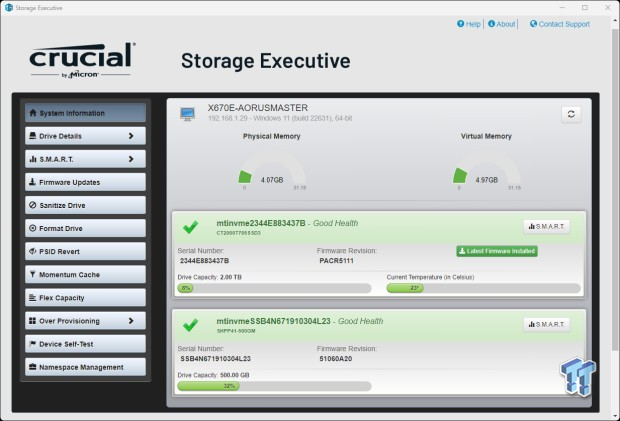
Crucial Storage Executive is among the best storage management software we've ever used. Get it HERE. Additionally, a free one-month membership to Adobe Creative Cloud All Apps is included when you purchase a T705 SSD. Finally, if that's not enough, you can get a free copy of Acronis True Image for Crucial, the software suite that can clone drives, backup your operating system, applications, settings, and all your data by clicking HERE.
Jon's Test System Specifications
Intel Test System
- Motherboard: GIGABYTE AORUS Z790 Xtreme X
- CPU: Intel Core i9-14900K - Buy from Amazon
- Cooler: Alphacool Eissturm Hurricane Copper 45 - Buy from Amazon
- RAM: Patriot Viper Xtreme 5 8000 48GB - Buy from Amazon
- Graphics Card: MSI SUPRIM X RTX 3080 12GB - Buy from Amazon
- Case: PrimoChill's Praxis Wetbench - Buy from Amazon
- Power Supply: be quiet! Dark Power Pro 12 1200W - Buy from Amazon
- OS: Microsoft Windows 11 Pro 64-bit - Buy from Amazon
AMD Test System
- Motherboard: GIGABYTE X670E AORUS Master
- CPU: AMD Ryzen 9 7950X - Buy from Amazon
- Cooler: Alphacool Eissturm Hurricane Copper 45 - Buy from Amazon
- RAM: Sabrent Rocket DDR5 32GB - Buy from Amazon
- Graphics Card: MSI SUPRIM X RTX 3080 12GB - Buy from Amazon
- Case: PrimoChill's Praxis Wetbench - Buy from Amazon
- Power Supply: be quiet! Dark Power Pro 12 1200W - Buy from Amazon
- OS: Microsoft Windows 11 Pro 64-bit - Buy from Amazon
Because we at TweakTown like to be first at everything whenever we can, we will present our storage performance results for the test subject on both 14th Gen Intel and 7000 Series AMD platforms going forward for the foreseeable future. Because Intel still delivers the best real-world storage performance, (Look Here), our running chart will continue to be Intel-based until AMD can deliver better real-world storage performance than its rival.

Crucial T700 2TB Gen5 NVMe M.2 SSD with Heatsink
Sony PlayStation 5 - M.2 Storage Expansion
PS5 Read Performance
With Sony's wildly popular PlayStation 5 console now enabled for M.2 NVMe SSDs to be used as fast storage expansion, we include results for PS5 compatible SSDs we test as a part of our reviews going forward.
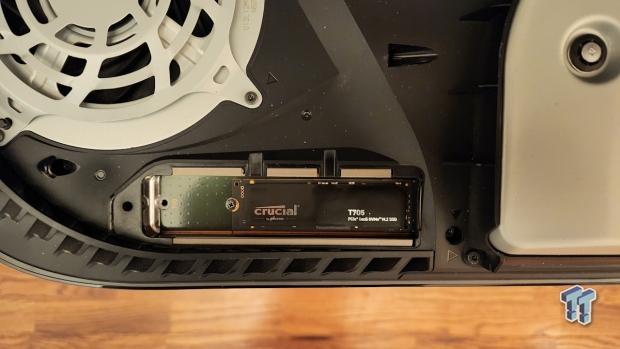
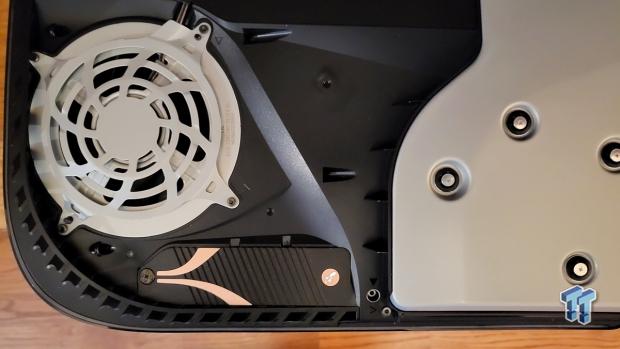
For SSDs that don't have an adequately sized PS5 compatible heatsink or other SSDs where the heatsink provided doesn't fit right and can be removed, we both use and recommend Sabrent's unparalleled PS5 heatsink available HERE.
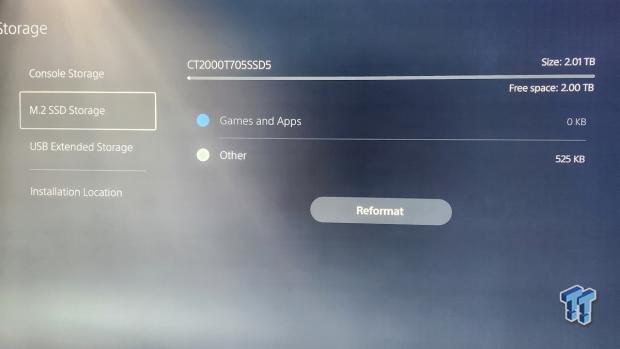
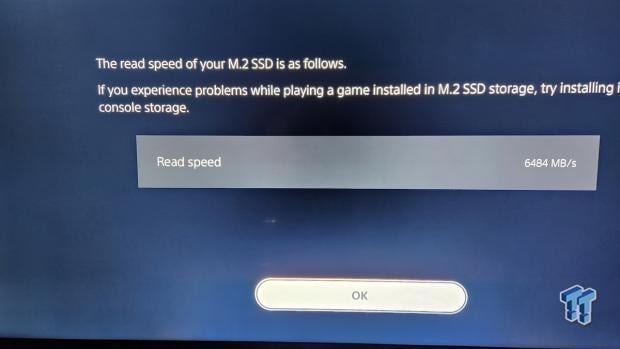
We only chart SSDs that can deliver a minimum of 5,500 MB/s read, which is Sony's original recommendation.
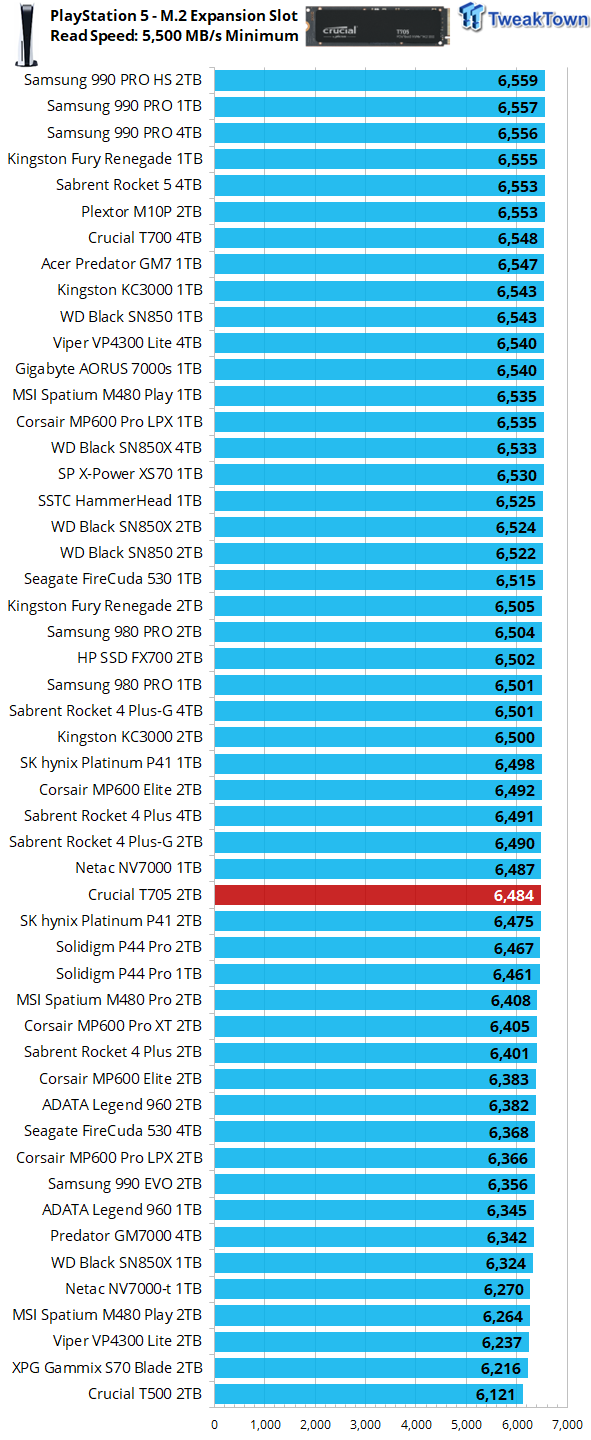
6,484 MB/s is right in there with what we want to see from a 2TB Phison-controlled SSD employed as PS5 M.2 storage expansion.
Synthetic Benchmarks: CDM, Anvil, ATTO
CrystalDiskMark
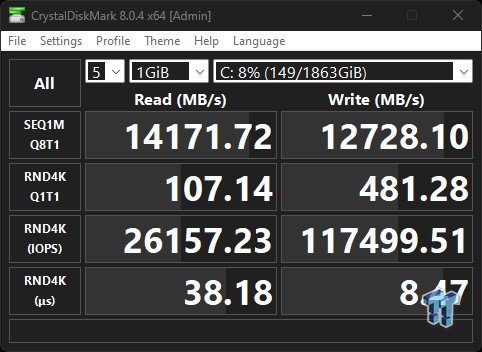
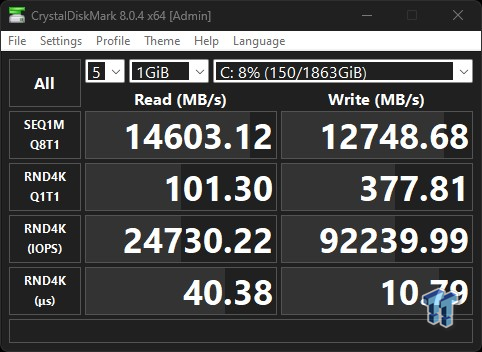
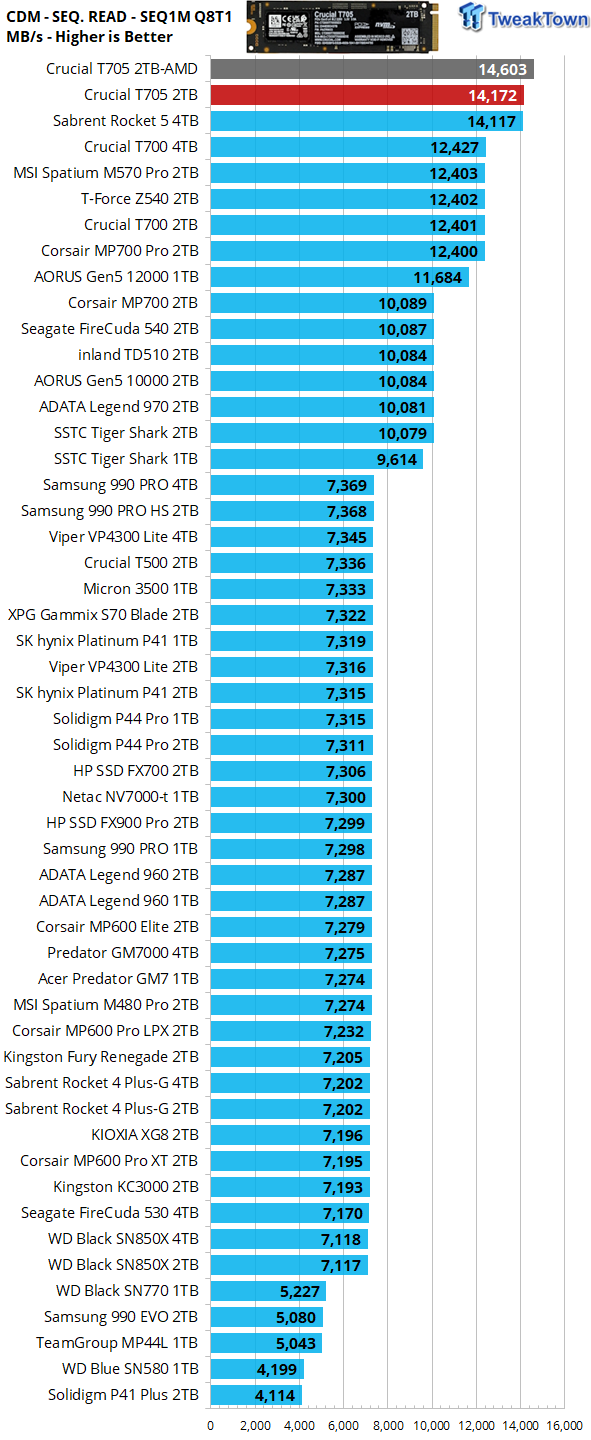
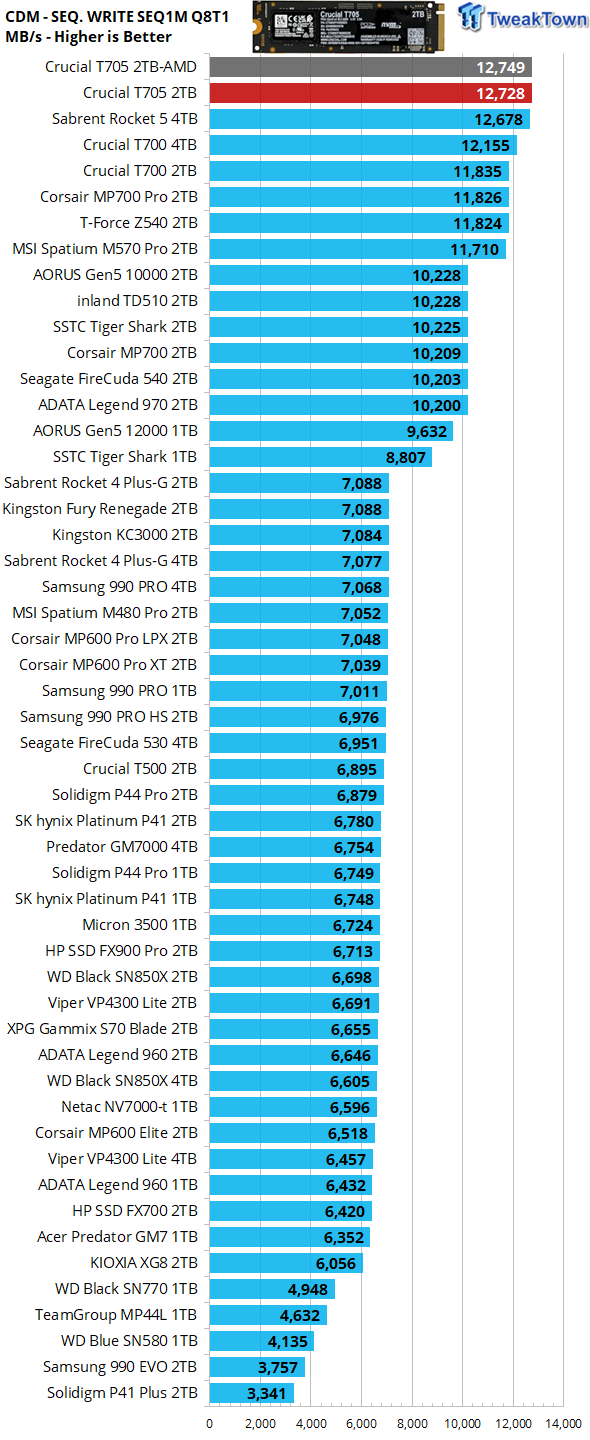
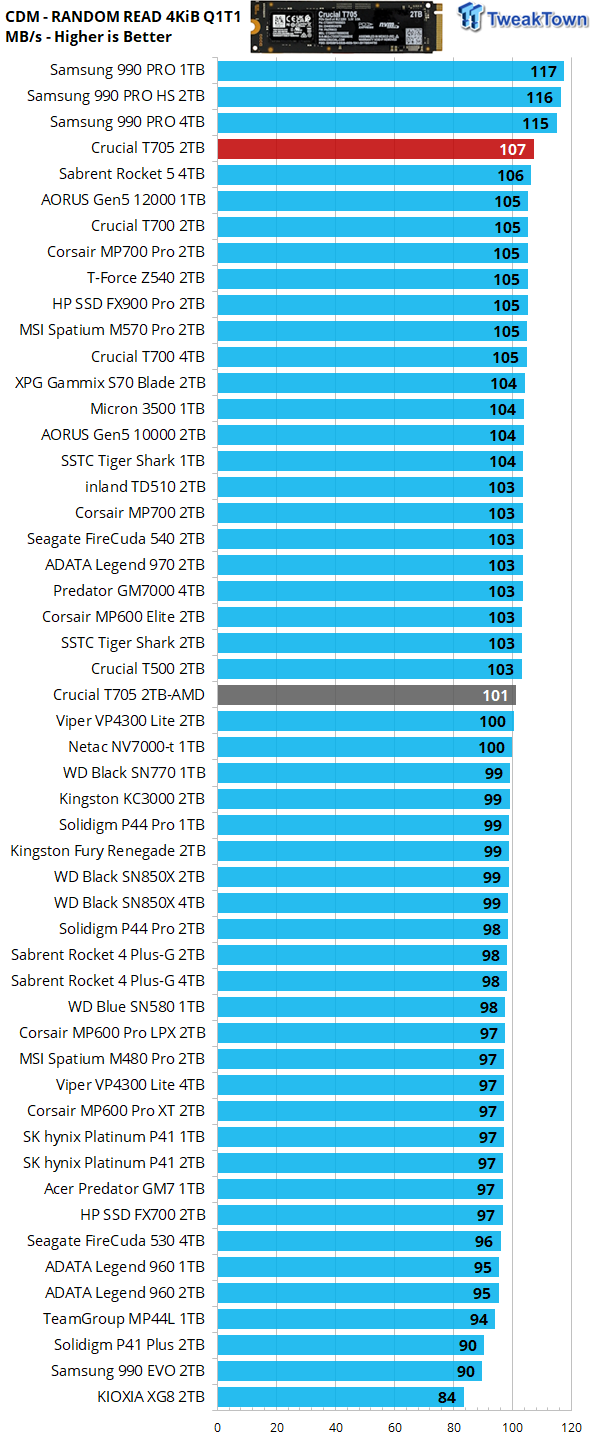
We employ CDM as our standard measurement for both sequential throughput and Q1T1 random read. In terms of sequential throughput, we find our test subject fully capable of meeting and exceeding quoted up to E26 controller specifications. 14,600 MB/s sequential reads and 12,700 MB/s sequential writes are the best we've ever recorded for a retail-labeled consumer SSD. At over 107 MB/s Q1T1 random read speed, the 2TB T705 is delivering massive performance where it matters most.
Anvil's Storage Utilities
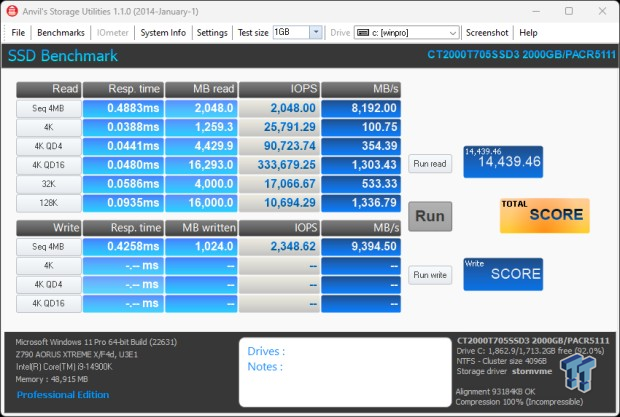
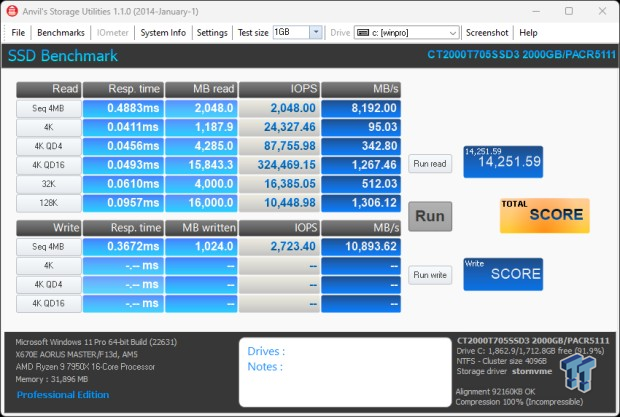
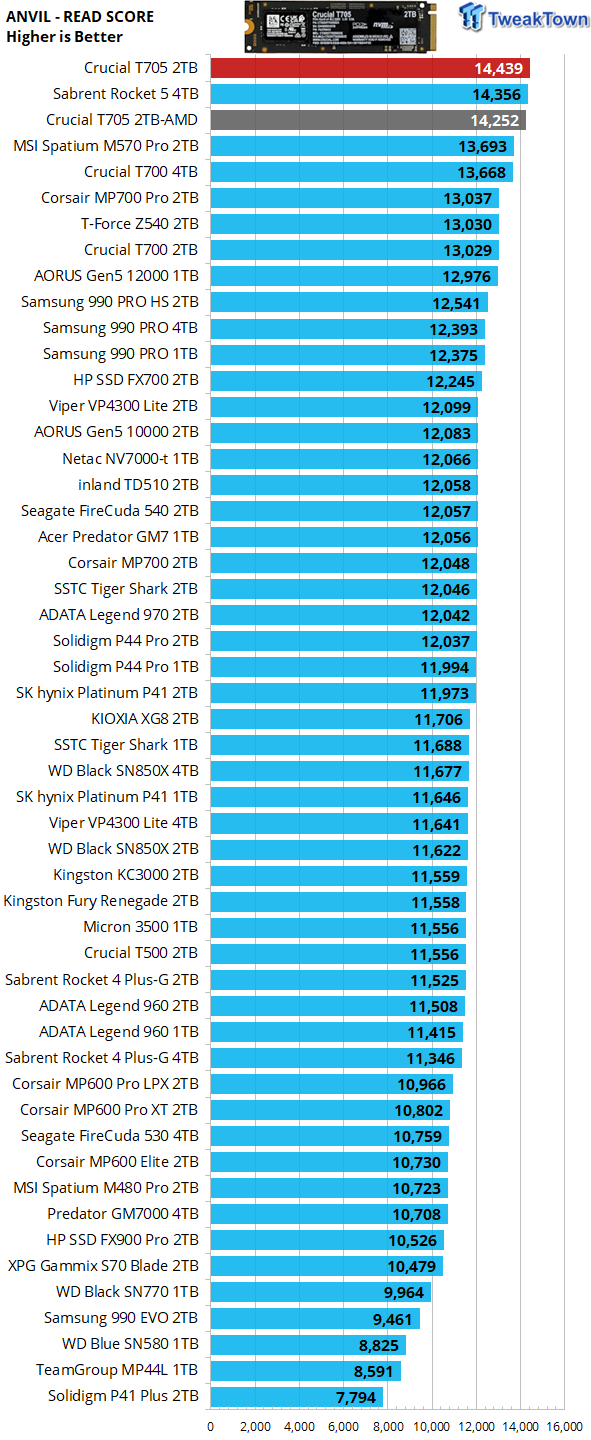
14,439 is an incredible score; in fact, it is a new lab record for a flash-based SSD, and because this is read performance, it gives us a clear and powerful indication that real-world performance has been significantly increased over its immediate predecessor, the T700.
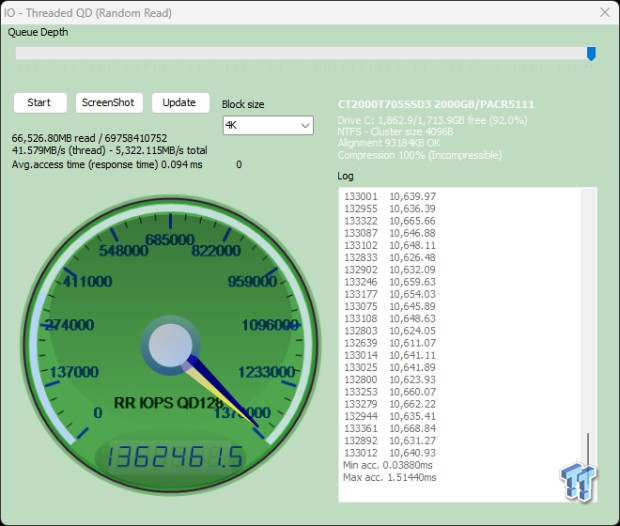
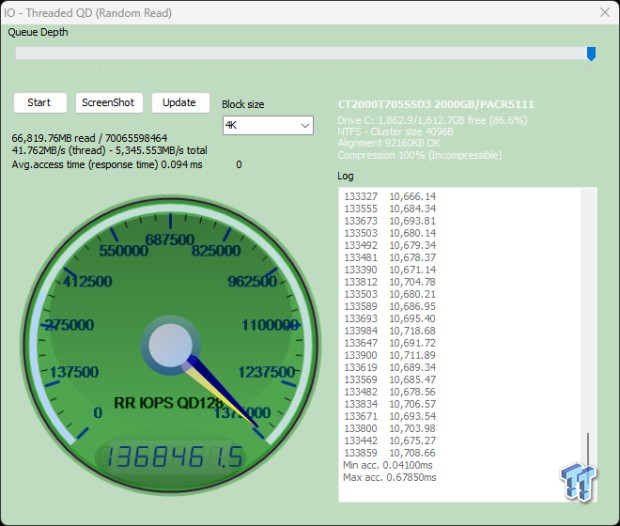
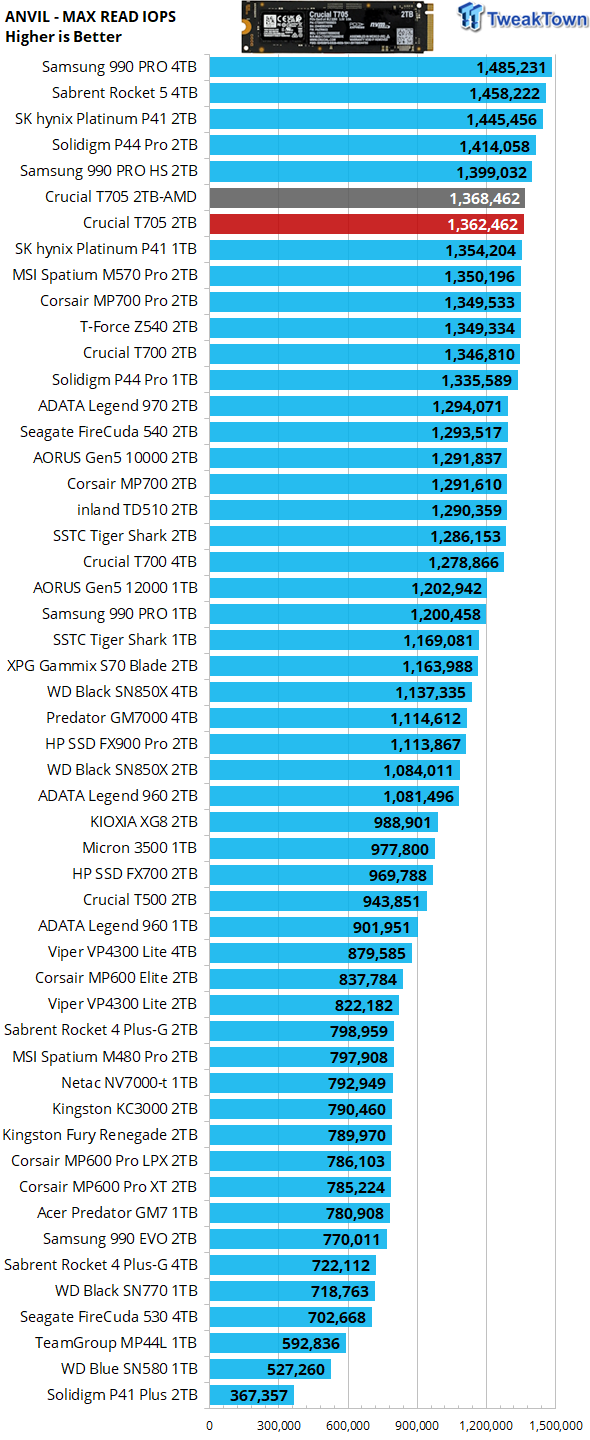
We employ Anvil's random read test as our standard for measuring max random read IOPS. This test is very accurate as it at its core is Iometer skinned over. We test at QD128. Our results, while quite good, are lower than what we've attained previously with this same hardware configuration running on standard Phison retail ready EQFM22.3 firmware. This indicates to us that Crucial has indeed customized its firmware for the T705 to deliver a bit more at lower queue depths where it matters most.
ATTO
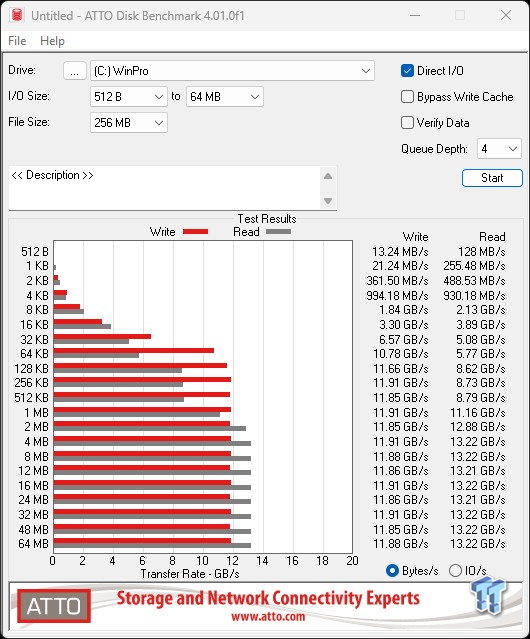
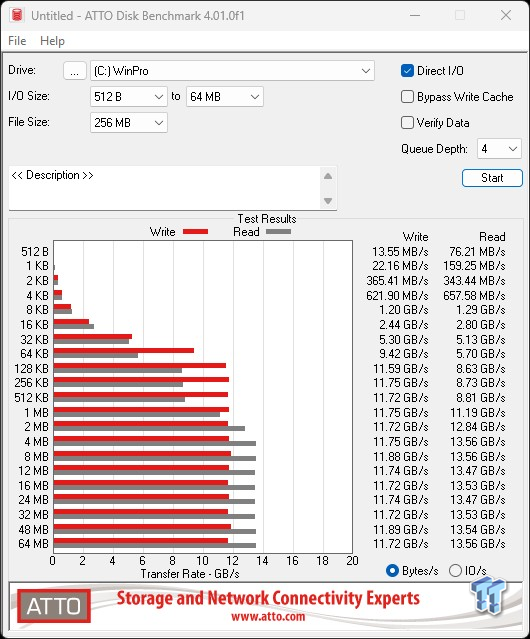
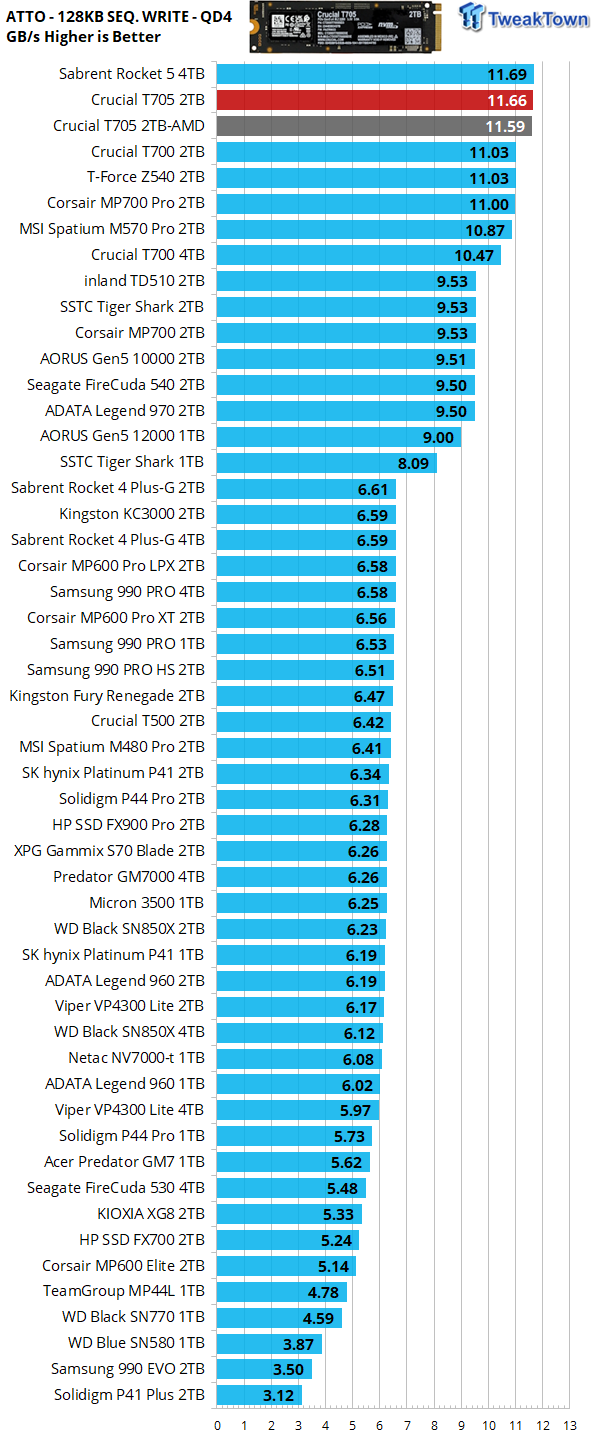
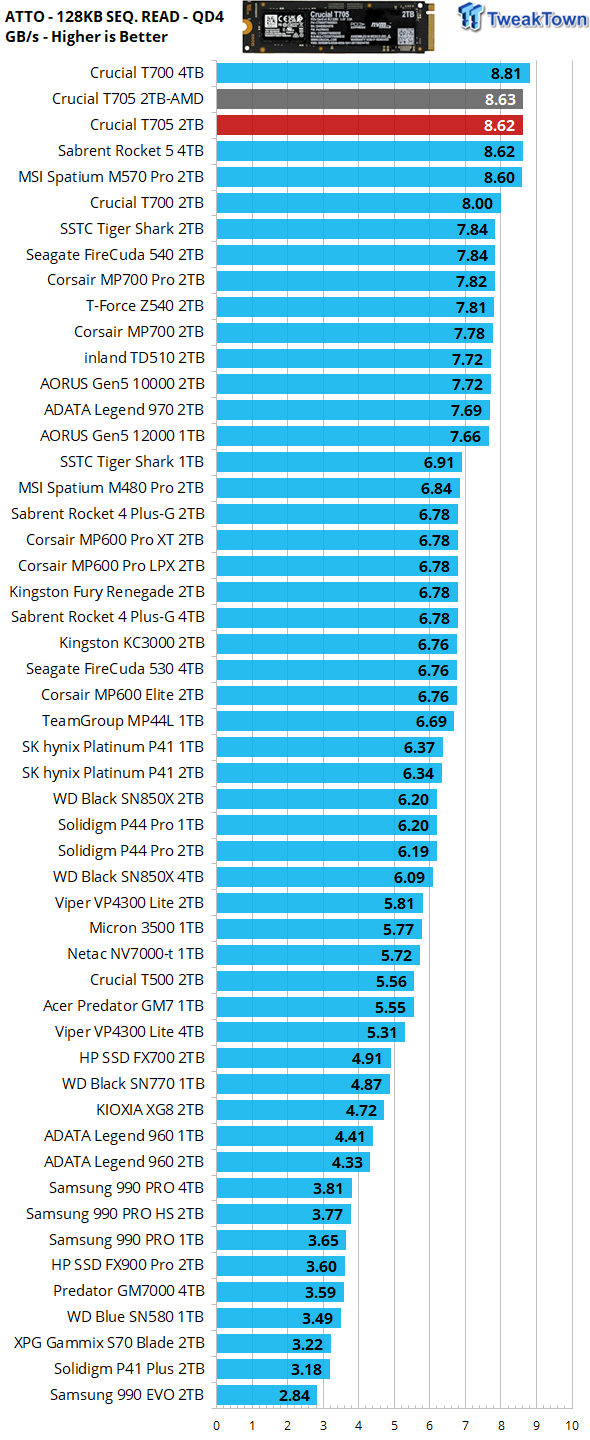
ATTO gives us a clear picture of what transfer sizes a particular SSD favors in terms of sequential throughput. We chart 128K transfers. At a queue depth of four, the 2TB T705 favors sequential transfers of 4MB or larger when serving data to the host (reading) and 256K or larger when programming (writing) data. Read throughput at 4MB transfers is especially impressive as we are getting up to 13.56 GB/s throughput at the low queue depth of four.
Real-World Testing: Transfers, 3DMark SSD Gaming Test, PCM10 Storage
Transfer Rates
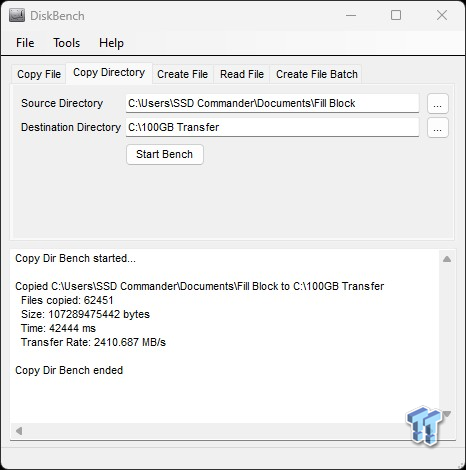
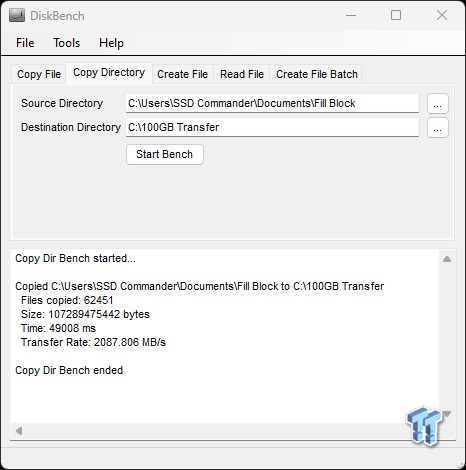
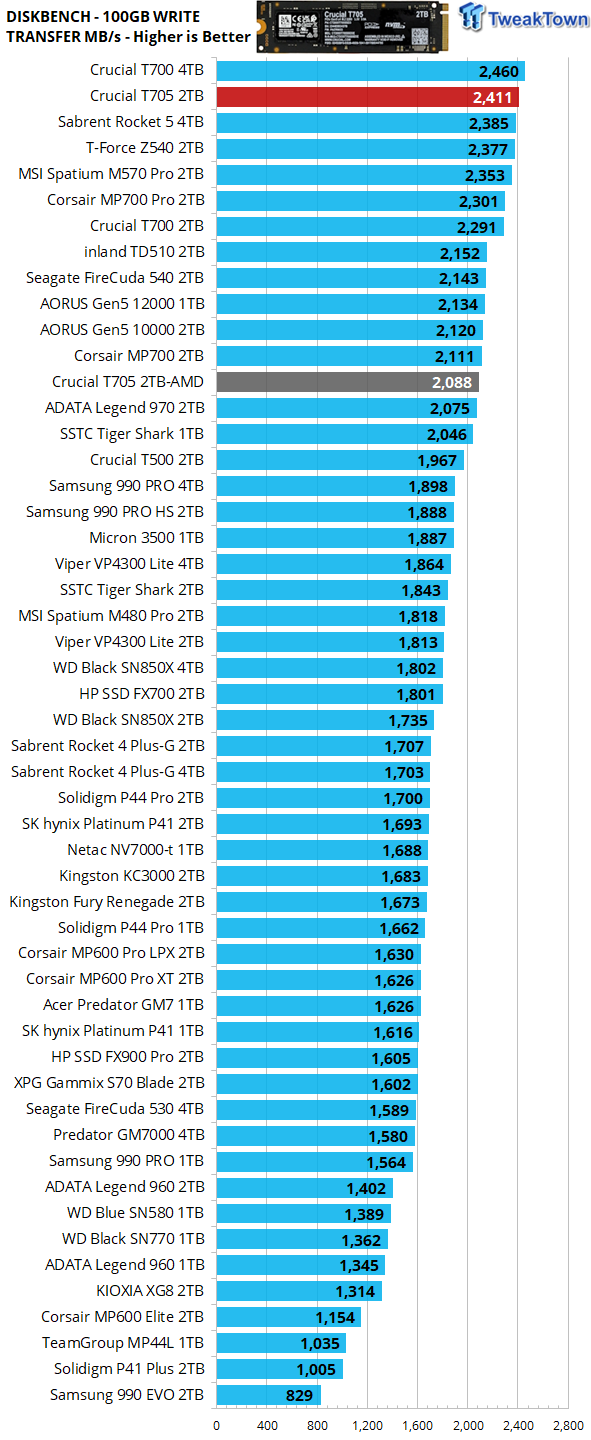
Our 100GB data transfer test is not your ordinary 100GB of data. Ours is a crushing mix composed of more than 62K files. Write performance, random or sequential, is an infrequent operation, and as such, we do not consider it to be an important performance metric in the consumer space. An example being how many times is a game installed vs. how many times it's played. At 2,400 MB/s our test subject is right in there with the best we've ever attained.
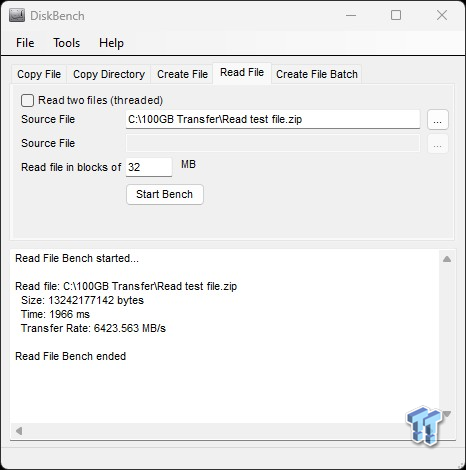
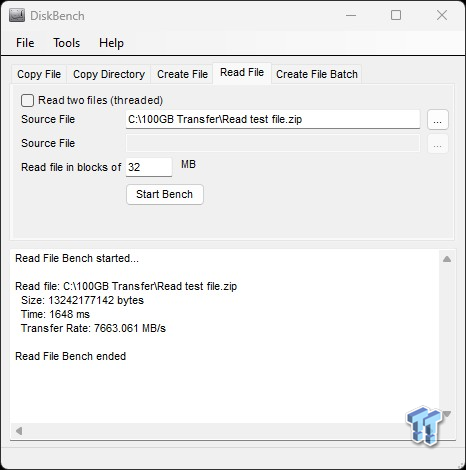
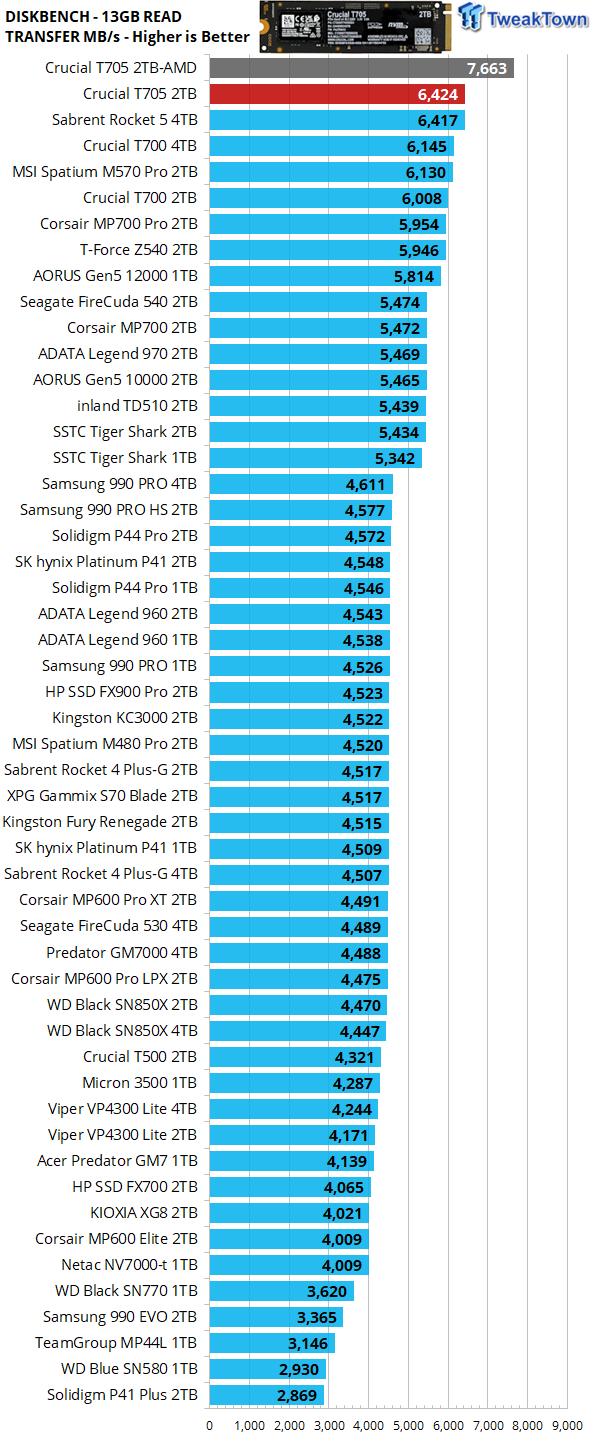
Unlike programming (writing) data, serving data to the host (reading) is always an important performance metric as it relates to the consumer space. 7,663 MB/s here is the highest transfer rate we've ever attained for this test at any time. Impressive.
3DMark SSD Gaming Test
UL's newest 3DMark SSD Gaming Test is the most comprehensive SSD gaming test ever devised. We consider it superior to testing against games themselves because, as a trace, it is much more consistent than variations that will occur between runs on the actual game itself. This test is the same as running the actual game, just without the inconsistencies inherent to application testing. In short, we believe that this is the world's best way to test an SSD's gaming prowess and accurately compare it against competing SSDs. The 3DMark SSD Gaming Test measures and scores the following:
- Loading Battlefield V from launch to the main menu.
- Loading Call of Duty Black Ops 4 from launch to the main menu.
- Loading Overwatch from launch to the main menu.
- Recording a 1080p gameplay video at 60 FPS with OBS (Open Broadcaster Software) while playing Overwatch.
- Installing The Outer Worlds from the Epic Games Launcher.
- Saving game progress in The Outer Worlds.
- Copying the Steam folder for Counter-Strike Global Offensive from an external SSD to the system drive.
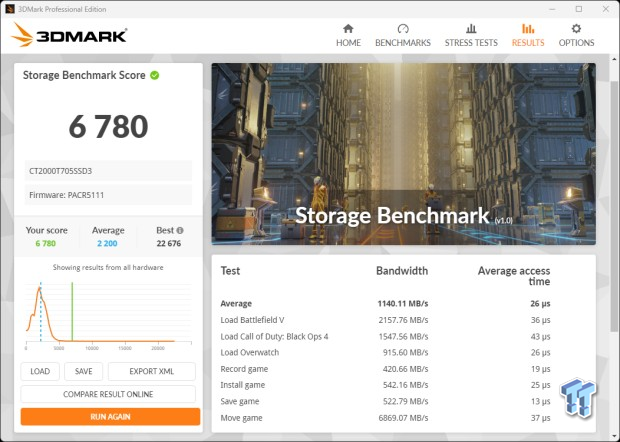
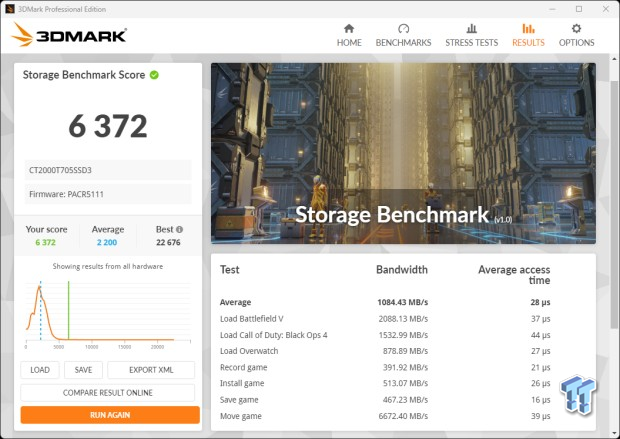
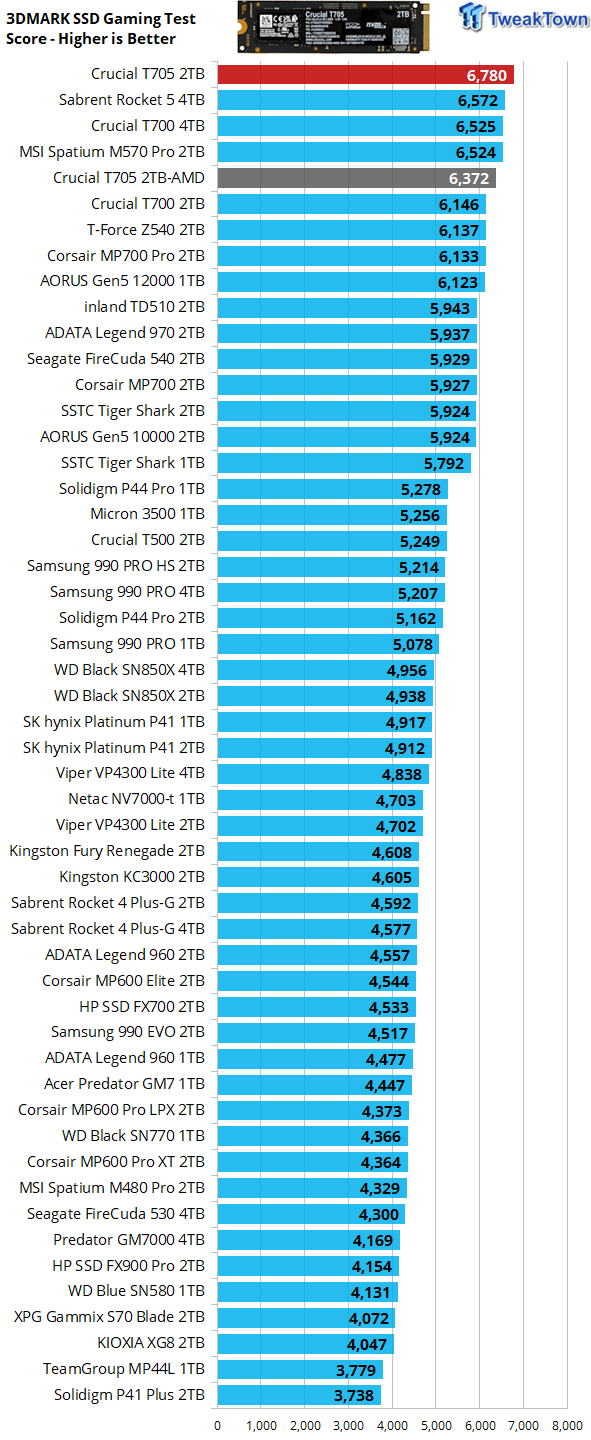
Gaming is a performance metric that matters to most DIY consumers, especially for the enthusiast crowd that TweakTown caters to. Now we've reached the point where results start to matter as they are a direct reflection of user experience. As expected, our 2TB contender delivers the highest result we've ever attained from a full-on retail flash-based SSD. Combine that with its DirectStorage prowess, and what we have here is the best-performing flash-based gaming SSD for the foreseeable future.
PCM10 Storage Tests
PCMark 10 Storage Test is the most advanced and most accurate real-world consumer storage test ever made. There are four different tests you can choose from; we run two of them. The Full System Drive Benchmark and the Quick System Drive Benchmark. The Full System Drive Benchmark writes 204 GB of data over the duration of the test. These tests directly correlate with mainstream user experience.
PCMark 10 Full System Drive Benchmark
This test writes 204GB data and covers a broad range of common consumer tasks, including booting Windows 10, file transfers, Adobe and Office applications, and startup times for games including Battlefield V, COD Black Ops 4, and Overwatch. Unlike synthetic numbers, this is comprehensive real-world data, which is why we use it to rank SSDs in terms of user experience.
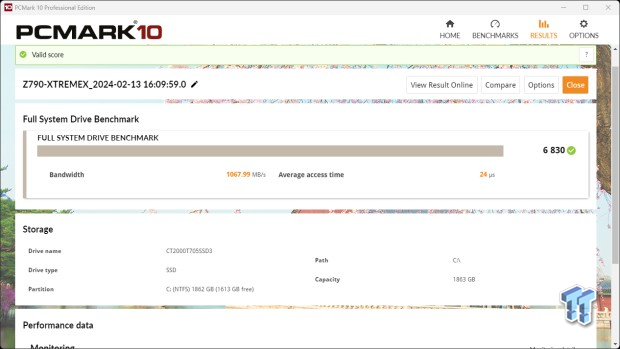
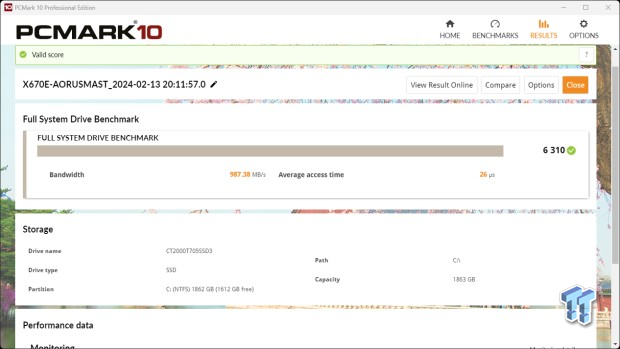
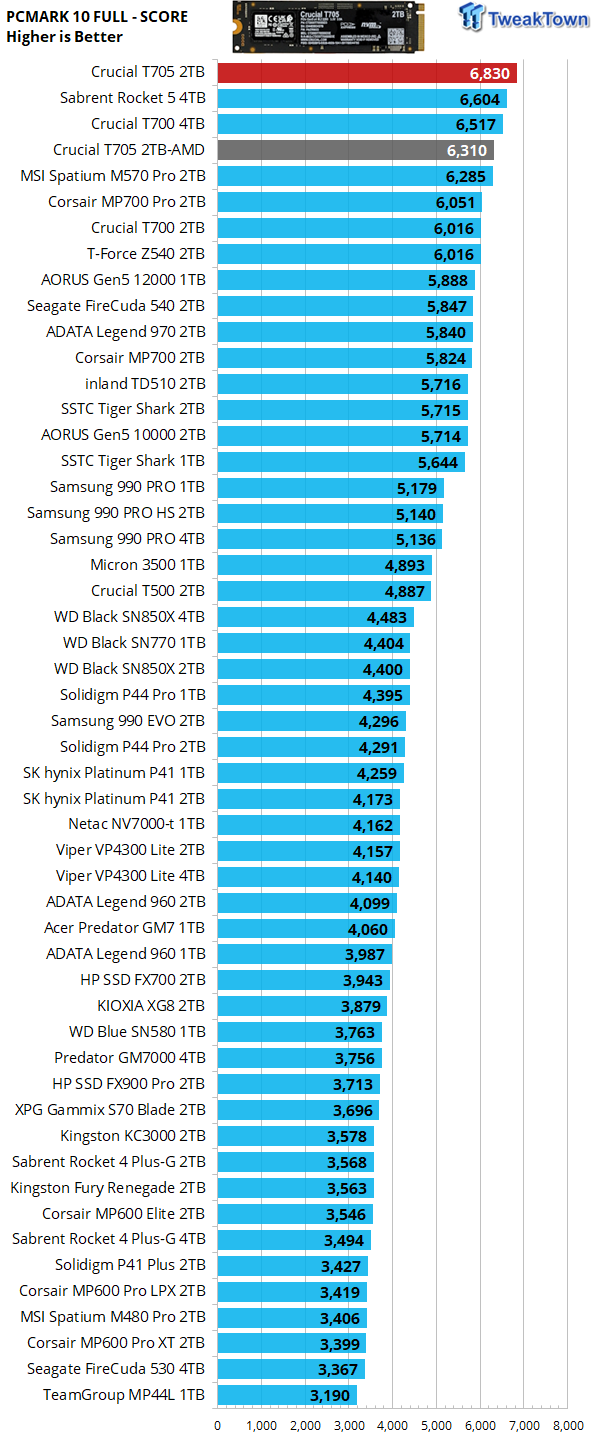
Crucial's T705 2TB is the first flash-based SSD to score 6,800 here. Outstanding.
PCMark 10 Quick System Drive Benchmark
The Quick System Drive Benchmark writes 23 GB of data over the duration of the test.
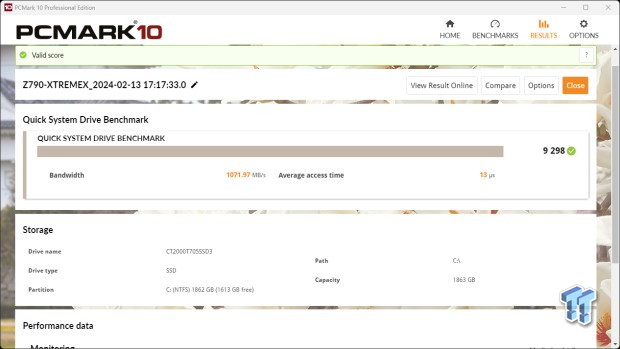
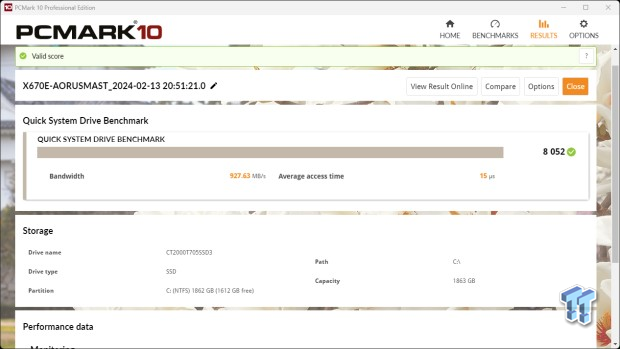
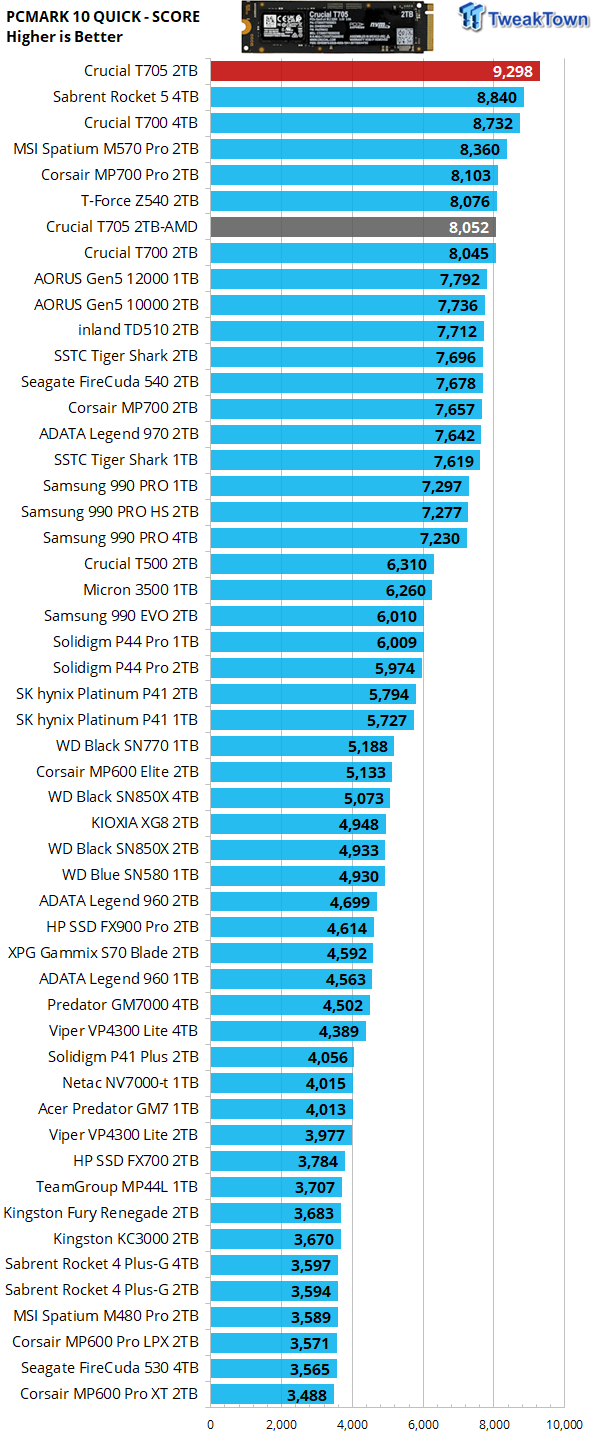
This is user experience on a higher level. It is yet again better than we've ever attained from any retail flash-based SSD including Phison's Max14um Reference Design, again indicating to us that Crucial has customized firmware running on its T705.
Final Thoughts
As it stands right now, Crucial is cranking out the highest-performing flash-based SSDs of their kind ever made. Part of the reason for this is their close partnership with Phison Electronics, who deliver the most advanced consumer SSD controllers in the industry. However, as we alluded to previously, the flash is just as important an ingredient to the mix, and only Crucial has unfettered fab-level access to 2,400 MT Micron B58R, well, because they are Micron. Crucial bins the best of the best for themselves no doubt, ultimately giving themselves an advantage over other Phison partners. As we see it, this is what the T705 is all about.
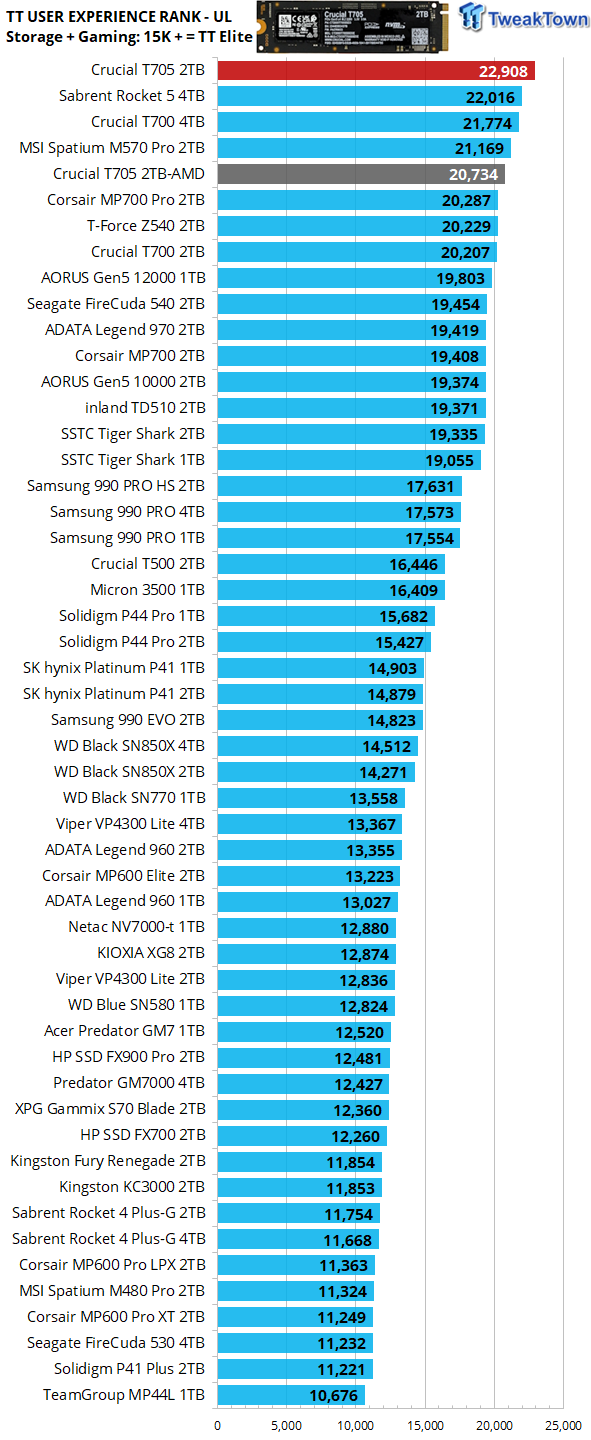
We rank SSDs in terms of overall user experience (performance where it matters most) as expressed by PCMark 10 storage and 3DMark gaming storage tests. We consider a user experience score of 15K or more to verify an SSD as a TweakTown Elite performer. Crucial's 2TB T705 is the first flash-based SSD of any kind, retail or ES, to cross the 22,900 plateau. Epic.
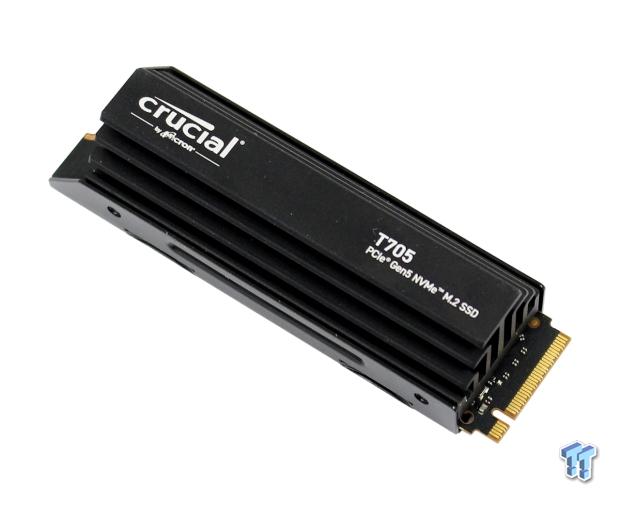
The T705 is the ultimate enthusiast storage platform, delivering the most where it matters the most. Global product availability is set for March 12, 2024. Editor's Choice.

